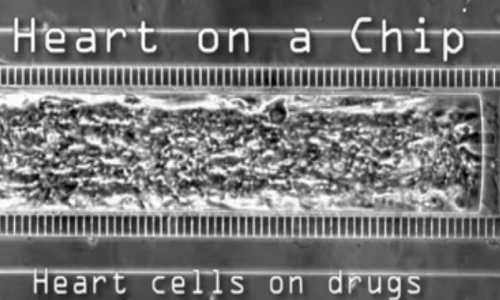UC Berkeley researchers, led by bioengineering professor Kevin Healy, have been able to test heart drugs on human cardiac muscle cells housed in an inch-long silicone device.
The video shows cardiac muscle cells before and after exposure to isoproterenol, a drug used to treat certain heart ailments, including bradycardia (slow heart rate). It’s clear that the cells beat faster after 30 minutes of exposure to isoproterenol. The study’s lead author is Anurag Mathur. The project is funded through the Tissue Chip for Drug Screening initiative, an interagency collaboration launched by the National Institutes of Health to develop 3-D human tissue chips that model the structure and function of human organs. “Ultimately, these chips could replace the use of animals to screen drugs for safety,” said Healy.
Story Source:
The above story is based on materials provided by Berkeley.





